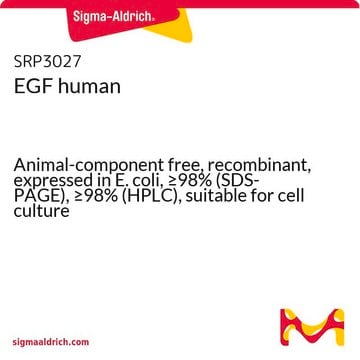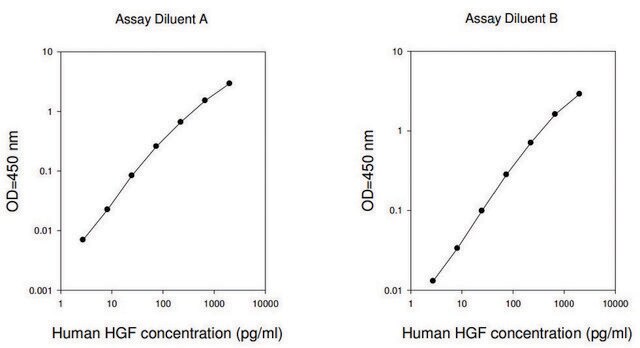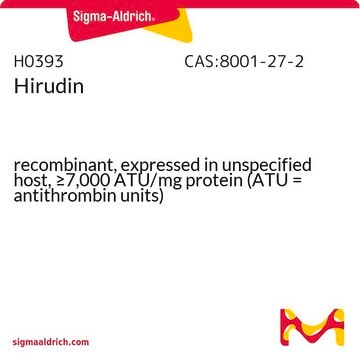SRP3300
HGF mouse
recombinant, expressed in Hi-5 Insect cells, ≥95% (SDS-PAGE), ≥95% (HPLC)
Sinónimos:
Hepatopoietin (HPTA), Scatter Factor (SF)
Iniciar sesiónpara Ver la Fijación de precios por contrato y de la organización
About This Item
Código UNSPSC:
12352202
NACRES:
NA.32
Productos recomendados
origen biológico
mouse
recombinante
expressed in Hi-5 Insect cells
Ensayo
≥95% (HPLC)
≥95% (SDS-PAGE)
Formulario
lyophilized
potencia
10-20 ng/mL
mol peso
80.0 kDa
envase
pkg of 20 μg
impurezas
<0.1 EU/μg endotoxin, tested
color
white to off-white
Nº de acceso UniProt
Condiciones de envío
wet ice
temp. de almacenamiento
−20°C
Información sobre el gen
mouse ... HGF(15234)
Descripción general
Hepatocyte growth factor (HGF) is a plasmin related disulfide-linked, hetereodimeric protein containing an α and a β chain. It is synthesized as inactive, single-chain precursor which shares similarity with plasminogen. Its α chain contains an N-terminal hairpin and four kringle domains (NK4).
Acciones bioquímicas o fisiológicas
Hepatocyte growth factor (HGF) functions via its receptor c-Met, which gets activated upon tyrosine phosphorylation, and subsequently promotes epithelial cell proliferation, morphogenesis, angiogenesis and motility. It plays a crucial role in organ development, as inactivation of either this gene or its receptor in fetal stages results in organ hypoplasia. Endogenously this protein is involved in the self-repair of various ograns including injured livers, kidneys, lungs etc. HGF is a predominant potent factor involved in lung growth and repair. It functions as a motogen, tubulogen and anti-apoptotic agent on airway epithelial and other cells expressing HGF receptor c-Met. Studies in mice show that HGF determines the severity of Pseudomonas aeruginosa keratitis by enhanced HGF signaling through c-met resulting in elevated pro-inflammatory cytokines and reduced anti-inflammatory cytokines.
Forma física
Lyophilized from 10 mM Tris, pH 7.2 + 100mM L-Arginine + 200 mM NaCl.
Reconstitución
Centrifuge the vial prior to opening. Reconstitute in water to a concentration of 0.1-1.0 mg/mL. Note: Slow to dissolve. Do not vortex. This solution can be stored at 2-8°C for up to 1 week. For extended storage, it is recommended to further dilute in a buffer containing a carrier protein (example 0.1% BSA) and store in working aliquots at -20°C to -80°C.
Código de clase de almacenamiento
10 - Combustible liquids
Clase de riesgo para el agua (WGK)
WGK 3
Punto de inflamabilidad (°F)
Not applicable
Punto de inflamabilidad (°C)
Not applicable
Elija entre una de las versiones más recientes:
¿Ya tiene este producto?
Encuentre la documentación para los productos que ha comprado recientemente en la Biblioteca de documentos.
Los clientes también vieron
Regulation of hepatocyte growth factor in mice with pneumonia by peptidases and trans-alveolar flux.
Raymond WW et al
PLoS ONE, 10(5), e0125797-e0125797 (2015)
HGF signaling impacts severity of Pseudomonas aeruginosa keratitis.
Jiang X et al
Investigative Ophthalmology & Visual Science, 55(4), 2180-2190 (2014)
Kaisa L Hanley et al.
Molecular cancer research : MCR, 20(3), 337-349 (2021-11-24)
The Ras/Erk and NF-κB pathways play critical roles in cell proliferation and are known to drive oncogenesis when overactivated. Herein we report a gatekeeper function of the two pathways by working in synergy to suppress liver tumorigenesis. Hepatocyte-specific deletion of
L Naldini et al.
The EMBO journal, 10(10), 2867-2878 (1991-10-01)
Scatter Factor (SF) is a fibroblast-secreted protein which promotes motility and matrix invasion of epithelial cells. Hepatocyte Growth Factor (HGF) is a powerful mitogen for hepatocytes and other epithelial tissues. SF and HGF, purified according to their respective biological activities
Rajeswara R Pannem et al.
Hepatology (Baltimore, Md.), 60(3), 1066-1081 (2014-05-09)
Hepatic fibrosis is considered as a physiological wound-healing response to liver injury. The process involves several factors, such as hepatocyte growth factor (HGF), which restrains hepatic injury and facilitates reversibility of fibrotic reaction in response to an acute insult. Chronic
Nuestro equipo de científicos tiene experiencia en todas las áreas de investigación: Ciencias de la vida, Ciencia de los materiales, Síntesis química, Cromatografía, Analítica y muchas otras.
Póngase en contacto con el Servicio técnico











